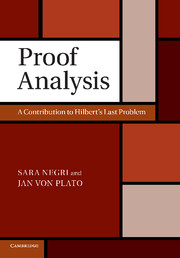Book contents
- Frontmatter
- Contents
- Preface
- Prologue: Hilbert's last problem
- 1 Introduction
- PART I PROOF SYSTEMS BASED ON NATURAL DEDUCTION
- PART II PROOF SYSTEMS BASED ON SEQUENT CALCULUS
- PART III PROOF SYSTEMS FOR GEOMETRIC THEORIES
- PART IV PROOF SYSTEMS FOR NON-CLASSICAL LOGICS
- Bibliography
- Index of names
- Index of subjects
Prologue: Hilbert's last problem
Published online by Cambridge University Press: 07 October 2011
- Frontmatter
- Contents
- Preface
- Prologue: Hilbert's last problem
- 1 Introduction
- PART I PROOF SYSTEMS BASED ON NATURAL DEDUCTION
- PART II PROOF SYSTEMS BASED ON SEQUENT CALCULUS
- PART III PROOF SYSTEMS FOR GEOMETRIC THEORIES
- PART IV PROOF SYSTEMS FOR NON-CLASSICAL LOGICS
- Bibliography
- Index of names
- Index of subjects
Summary
David Hilbert presented his famous list of open mathematical problems at the international mathematical congress in Paris in 1900. First in the list was Cantor's continuum problem, the question of the cardinality of the set of reals numbers. The second problem concerned the consistency of the arithmetic of real numbers, i.e., of analysis, and so on. These problems are generally recognized and have been at the centre of foundational research for a hundred years, but few would be able to state how Hilbert's list ended: namely with a 23rd problem about the calculus of variations – or so it was thought until some years ago, when German historian of science Rüdiger Thiele found from old archives in Göttingen some notes in Hilbert's hand that begin with:
As a 24th problem of my Paris talk I wanted to pose the problem: criteria for the simplicity of proofs, or, to show that certain proofs are simpler than any others. In general, to develop a theory of proof methods in mathematics.
The 24th problem thus has two parts: a first part about the notion of simplicity of proofs, and a second one that calls for a theory of proofs in mathematics. Just as the problems that begin the list, what we call Hilbert's last problem has been at the centre of foundational studies for a long time.
- Type
- Chapter
- Information
- Proof AnalysisA Contribution to Hilbert's Last Problem, pp. 1 - 2Publisher: Cambridge University PressPrint publication year: 2011



